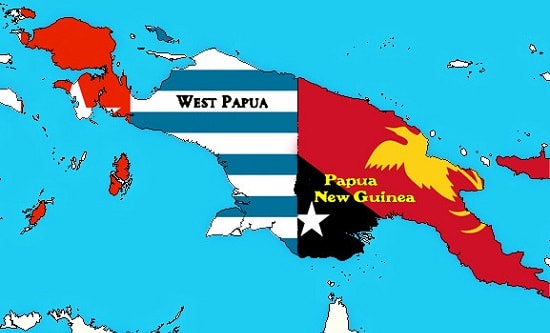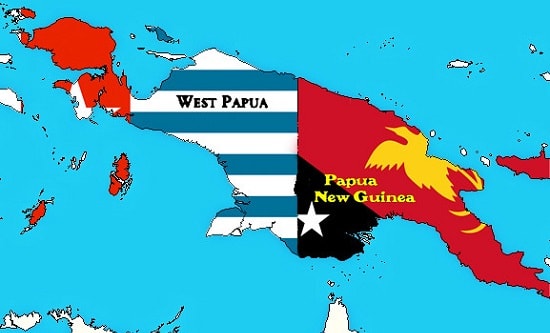
FRFI 216 August/September 2010
On 22 June 2010 the government of Vanuatu announced that it will officially sponsor West Papua’s case against its 1969 annexation by Indonesia at the International Court of Justice. It will also seek an investigation into the legality of the mining contract awarded by General Suharto to the US company Freeport McMoran in 1967, and request that West Papua be relisted with the UN Decolonisation Committee.
This could be the start of a nightmare for the Indonesian government in Jakarta and the multinational companies it protects. For 48 years they have collaborated to pillage Papuan land and eliminate Papuan identity. The Papuan dream is a referendum on independence.
Papua was first occupied by imperialist forces during European colonial times when the British, Germans and Dutch drew straight lines on the map and divided it up neatly between themselves. That line through Papua still exists today as the boundary between independent Papua New Guinea and Indonesian occupied West Papua. The western half was part of the Dutch East Indies as it was known at the time. During decolonisation most of the DEI was lumped together as Indonesia. West Papua was to be given independence but the Indonesian president at the time, Sukarno, wanted to hold on to it. There were other interested parties – huge reserves of copper had been found; there was gold in the rivers on the south coast; there was oil to be had and who knows what other resources were there to be exploited? US businessmen in the know were very interested. Dutch businessmen wanted the Dutch to remain the dominant influence. Everyone knew what the spoils could be.
So although the Dutch granted West Papua independence in 1961 and the bintang kejora (‘morning star’) national flag of West Papua was raised in the capital Jayapura, in 1963 the Indonesian military, led by General Suharto, invaded. The ‘morning star’ was torn down and the Indonesian flag raised.
The previous year, a remarkable meeting had been held in a New York hotel between some of the biggest businessmen in the world along with US President JF Kennedy, Prince Bernard of the Netherlands and the Indonesian military which essentially ceded control of West Papua to Indonesia.
The illegality of this transfer from one colonial master to another was masked by a referendum, stage-managed by the Indonesian military in 1969 – the ‘Act of No Choice’, as Papuans call it.
It is this illegal referendum that Vanuatu wants the International Court of Justice to investigate. In any free and fair referendum, an overwhelming majority of West Papuans would vote for independence, as in East Timor. Of course Jakarta will do everything within its power to stop it. The gigantic Grassberg-Freeport mine (the biggest copper and gold mine in the world) alone nets Jakarta a reported $1.5bn a year in direct taxes, royalties and dividends. Indonesia bans journalists and NGOs from visiting Papua and does all it can to silence the Papuan people. The Indonesian government recently tried to stop Al Jazeera airing the internationally acclaimed documentary Pride of Warriors.
The OPM, the armed wing of the Papuan resistance, was founded in 1965 and continues to raise the morning star flag every day in its mountain strongholds
In 2001, to try to deflect calls for a referendum, Jakarta imposed special autonomy status on West Papua. Small concessions were given, including a Papuan assembly confined to those parties legally allowed in Indonesia and based in Jakarta; Papuan political parties remained illegal. Under this special autonomy status, some of the vast revenues gained from West Papua by Indonesia were meant to be invested back into the region but many Papuans claim that where the money actually went is unknown. Promises were made about improving health and education but never materialised. Instead, an ever-larger area of Papuan rainforest (home to many Papuan tribes) was handed over to international logging companies. The transmigration programme, resettling people from heavily-populated parts of Java and Sulawesi to Papua, also intensified. Incentives for settlers include free land. No compensation is paid to tribes whose land is given away. Around 4,000 settlers arrive in Papua every month, the biggest organised settlement programme on earth.
On 10 June this year the Papuan people’s assembly unanimously declared that special autonomy had failed and demanded a referendum on independence. On 18 June 15,000 people marched to the Indonesian government building in Jayapura and gave them back their special autonomy document. 8 July brought 20,000 Papuans on the streets of Jayapura, with demonstrations all over West Papua.
The occupation of West Papua has been a dark secret for a long time, with the compliance of world governments and international institutions. For the Papuan people, as the world begins to take notice, they can start to see a glimmer of the light of freedom.
Andy Grey




